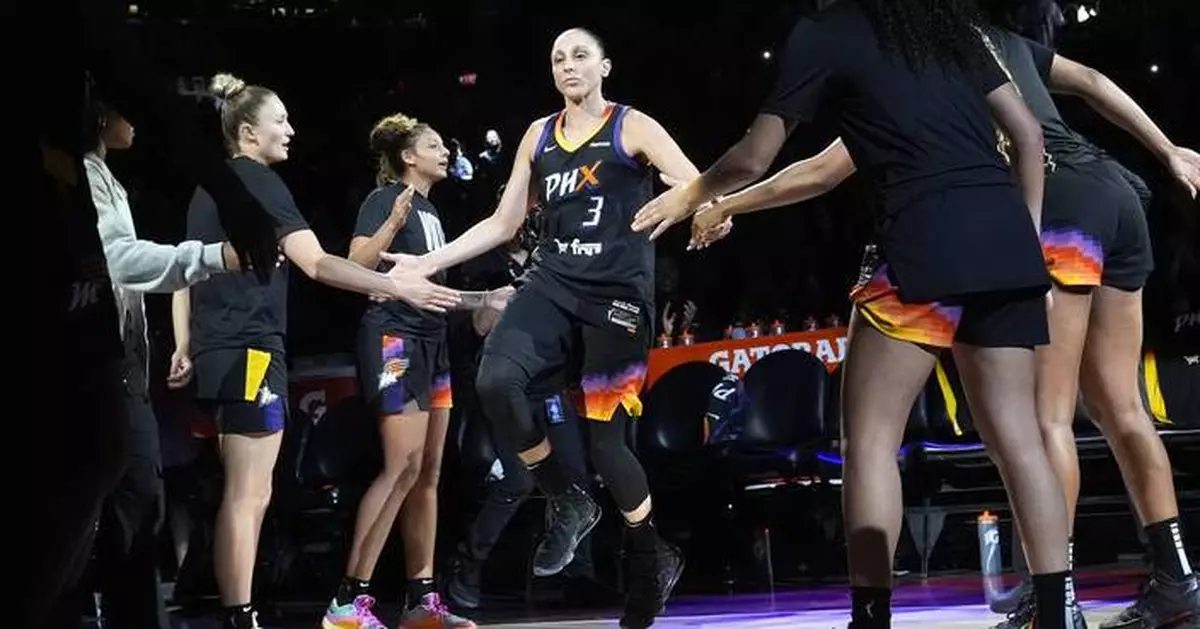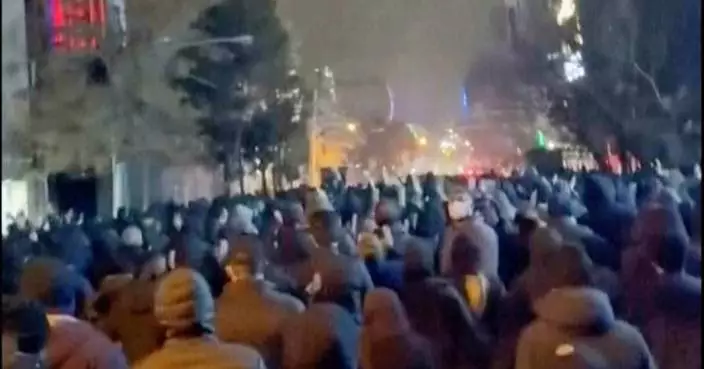PHOENIX (AP) — Diana Taurasi stood in the middle of the court where she won championships and broke records during one of the greatest careers in women's basketball history.
She tried to get out the words out, but Phoenix's fans quickly interrupted.
“If this is the last time ... “ Taurasi said before the crowd started a lengthy chant of ”One more year!"
Taurasi hasn't decided if she will return for a 21st season, making Thursday night's game against Seattle as potentially the final at home in her storied career.
The Storm spoiled Taurasi's night with an 89-70 win, but there's no doubt what playing in Phoenix has meant to the player who has widely been called the best of all time.
“If it is the last time, it felt like the first time,” Taurasi said.
Taurasi’s teammates wore her No. 3 jersey — with a head of a goat (greatest of all time) sticking out of the number — for player introductions, a nod to the possibility it was her last game.
Despite a deafening roar during player introductions and her college coach Geno Auriemma of UConn in the stands, Taurasi treated the game like any other, slapping hands with her teammates before trotting onto the floor.
The night didn't turn out the way Taurasi wanted, but she got one last curtain call as Mercury fans started a chant of “We want DT” with three minutes left in the blowout loss. Taurasi's return lasted less than a minute before she jogged back to the bench waving as the fans chanted “One more year!”
“On a night like tonight, you don’t want to make it about you — you want to make it about DT,” Mercury coach Nate Tibbetts said. “This is a moment, when you experience it, you’re going to remember forever.”
The 42-year-old Taurasi finished with nine points on 3-of-9 shooting in 18 minutes, but gained much more in a game that meant little in the WNBA standings with the Mercury locked into a first-round playoff series against Minnesota.
The Mercury played a tribute video before Taurasi addressed the crowd and she lingered on the floor, hugging and taking pictures well after the final buzzer, including a long embrace with Auriemma.
"It's bittersweet in a lot of ways," Taurasi said. "When the season is over, I'll have a better idea of what it looks like for me in the future.”
Taurasi has been coy about retirement, remaining noncommittal while hinting it might be right around the corner.
The Mercury stoked the retirement talk embers on social media with a post last week that said “ If this is it ” and another early Thursday that included the reading of a letter by her wife, former Mercury player Penny Taylor.
Whenever Taurasi does hang up her basketball shoes, her place in women's basketball history will already be secured.
Taurasi won three straight national championship at UConn and kept on winning after the Mercury selected her with the No. 1 overall pick of the 2004 WNBA draft. She earned WNBA rookie of the year honors and won the first of three WNBA titles in 2007.
The Glendale, California native is one of four players to win multiple WNBA Finals MVPs (2009, 2014) and was the league MVP for the 2009 season. She won six Euroleague championships while playing year round most of her career and claimed her sixth Olympic gold medal at this summer's Paris Games. She's the WNBA's career scoring leader — about 3,000 more than Tina Charles in second — top playoff scorer and has made the most 3-pointers in league history.
Taurasi also made the all-WNBA first team 10 times and is an 11-time WNBA All-Star, including this season.
And she's barely slowed at 42, averaging 15.1 points, 3.9 rebounds and 3.4 assists while leading the Mercury to the playoffs.
“There’s still days where I’m like: I can still do this, I can still want to play basketball,” Taurasi said. “But then there’s days where I can barely crawl out of bed. That’s the struggle when you’re at this point in your career; you have to do so much you have to do to get back on the court."
Taurasi will be back on the court at least twice, against the Minnesota in the playoffs.
The Mercury will need to win at least one game to keep her season — and potentially career going — but Taurasi will go out on top no matter how it ends.
AP WNBA: https://apnews.com/hub/wnba-basketball
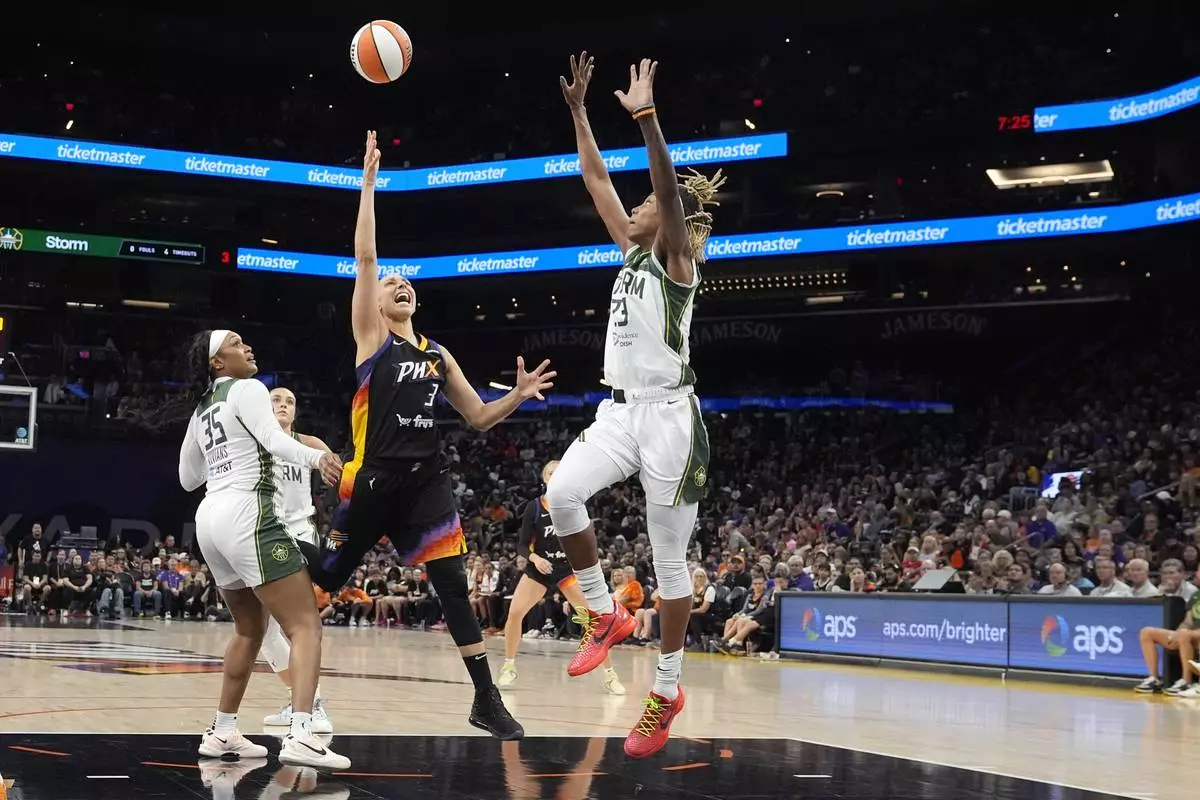
Phoenix Mercury guard Diana Taurasi (3) drives between Seattle Storm guard Victoria Vivians (35) and Storm guard Jordan Horston, right, during the first half of a WNBA basketball game Thursday, Sept. 19, 2024, in Phoenix. (AP Photo/Ross D. Franklin)
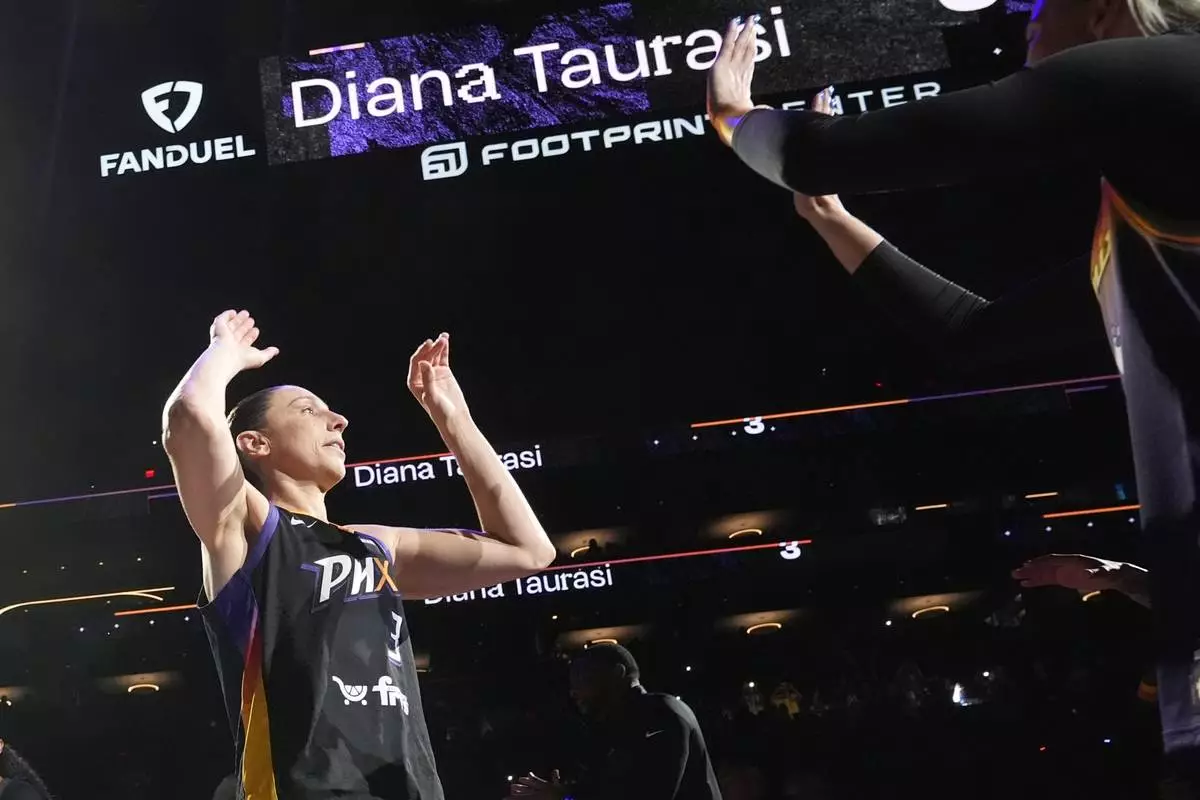
Phoenix Mercury guard Diana Taurasi, left, is greeted by Mercury guard Sophie Cunningham during player introductions prior to a WNBA basketball game against the Seattle Storm, Thursday, Sept. 19, 2024, in Phoenix. (AP Photo/Ross D. Franklin)
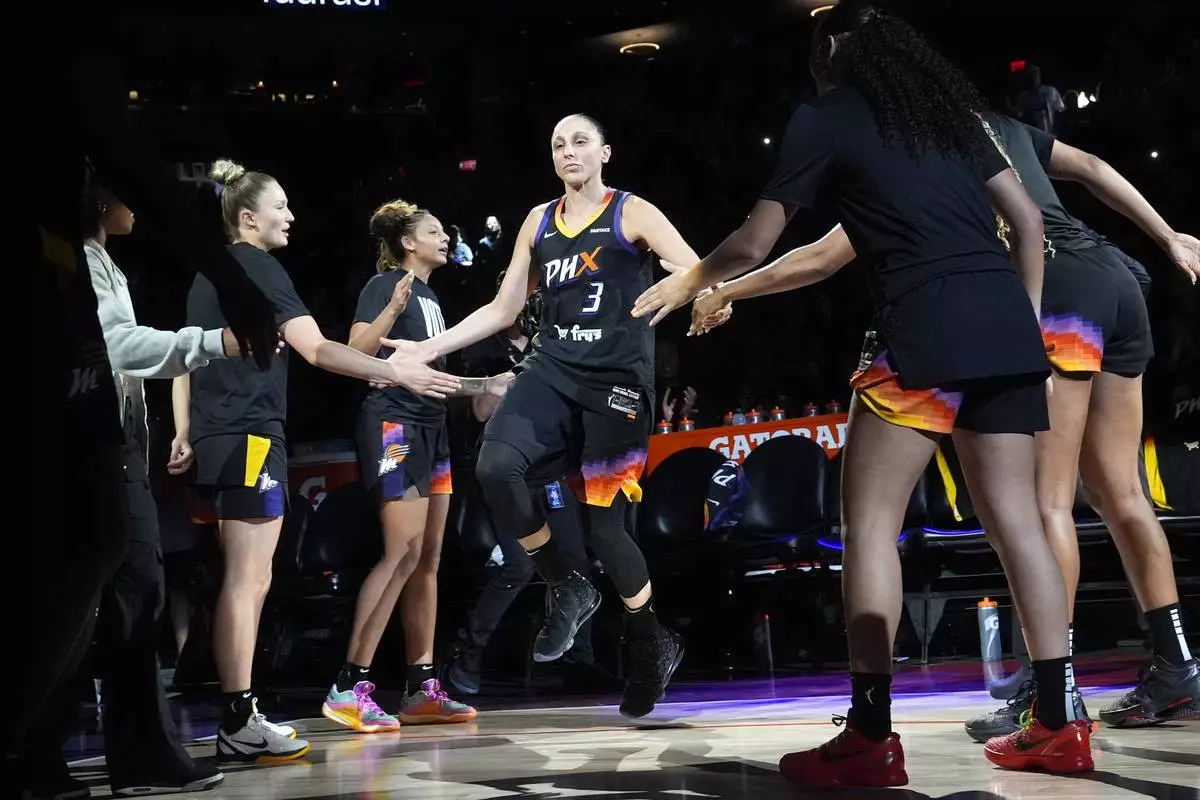
Phoenix Mercury guard Diana Taurasi (3) slaps hands with teammates during player introductions prior to a WNBA basketball game against the Seattle Storm, Thursday, Sept. 19, 2024, in Phoenix. (AP Photo/Ross D. Franklin)
RHO, Italy (AP) — No ice is colder and harder than speedskating ice. The precision it takes has meant that Olympic speedskaters have never competed for gold on a temporary indoor rink – until the 2026 Milan Cortina Winter Games.
In the pursuit of maximum glide and minimum friction, Olympic officials brought on ice master Mark Messer, a veteran of six previous Olympic speedskating tracks and the ice technician in charge of the Olympic Oval in Calgary, Canada — one of the fastest tracks in the world with over 300 records.
Messer has been putting that experience to work one thin layer of ice at a time since the end of October at the new Speed Skating Stadium, built inside adjacent trade fair halls in the city of Rho just north of Milan.
“It’s one of the biggest challenges I’ve had in icemaking,’’ Messer said during an interview less than two weeks into the process.
If Goldilocks were a speedskater, hockey ice would be medium hard, for fast puck movement and sharp turns. Figure skating ice would be softer, allowing push off for jumps and so the ice doesn’t shatter on landing. Curling ice is the softest and warmest of all, for controlled sliding.
For speedskating ice to be just right, it must be hard, cold and clean. And very, very smooth.
“The blades are so sharp, that if there is some dirt, the blade will lose the edge,’’ Messer said, and the skater will lose speed.
Speedskater Enrico Fabris, who won two Olympic golds in Turin in 2006, has traded in his skates to be deputy sports manager at the speedskating venue in Rho. For him, perfect ice means the conditions are the same for all skaters — and then if it's fast ice, so much the better.
"It's more of a pleasure to skate on this ice,'' he said.
Messer’s first Olympics were in Calgary in 1988 — the first time speedskating was held indoors. “That gave us some advantages because we didn’t have to worry about the weather, wind blowing or rain,’’ he said. Now he is upping the challenge by becoming the first ice master to build a temporary rink for the Olympics.
Before Messer arrived in Italy, workers spent weeks setting up insulation to level the floor and then a network of pipes and rubber tubes that carry glycol — an antifreeze — that is brought down to minus 7 or minus 8 degrees Celsius (17.6 to 19.4 degrees Fahrenheit) to make the ice.
Water is run through a purification system — but it can’t be too pure, or the ice that forms will be too brittle. Just the right amount of impurities “holds the ice together,’’ Messer said.
The first layers of water are applied slowly, with a spray nozzle; after the ice reaches a few centimeters it is painted white — a full day’s work — and the stripes are added to make lanes.
“The first one takes about 45 minutes. And then as soon as it freezes, we go back and do it again, and again and again. So we do it hundreds of times,’’ Messer said.
As the ice gets thicker, and is more stable, workers apply subsequent layers of water with hoses. Messer attaches his hose to hockey sticks for easier spreading.
What must absolutely be avoided is dirt, dust or frost — all of which can cause friction for the skaters, slowing them down. The goal is that when the skaters push “they can go as far as possible with the least amount of effort,’’ Messer said.
The Zamboni ice resurfacing machine plays a key role in keeping the track clean, cutting off a layer and spraying water to make a new surface.
One challenge is gauging how quickly the water from the resurfacing machine freezes in the temporary rink.
Another is getting the ice to the right thickness so that the Zamboni, weighing in at six tons, doesn’t shift the insulation, rubber tubing or ice itself.
“When you drive that out, if there’s anything moving it will move. We don’t want that,’’ Messer said.
The rink got its first big test on Nov. 29-30 during a Junior World Cup event. In a permanent rink, test events are usually held a year before the Olympics, leaving more time for adjustments. “We have a very small window to learn,’’ Messer acknowledged.
Dutch speedskater Kayo Vos, who won the men’s neo-senior 1,000 meters, said the ice was a little soft — but Messer didn’t seem too concerned.
“We went very modest to start, now we can start to change the temperatures and try to make it faster and still maintain it as a safe ice,’’ he said.
Fine-tuning the air temperature and humidity and ice temperature must be done methodically — taking into account that there will be 6,000 spectators in the venue for each event. The next real test will be on Jan. 31, when the Olympians take to the ice for their first training session.
“Eighty percent of the work is done but the hardest part is the last 20 percent, where we have to try to find the values and the way of running the equipment so all the skaters get the same conditions and all the skaters get the best conditions,’’ Messer said.
AP Winter Olympics: https://apnews.com/hub/milan-cortina-2026-winter-olympics

Serpentines are set on the ice of the stadium where speed skating discipline of the Milan Cortina 2026 Winter Olympics will take place, in Rho, outskirt of Milan, Tuesday, Nov. 11, 2025. (AP Photo/Luca Bruno)

Ice Master Mark Messer poses in the stadium where speed skating discipline of the Milan Cortina 2026 Winter Olympics will take place, in Rho, outskirt of Milan, Tuesday, Nov. 11, 2025. (AP Photo/Luca Bruno)
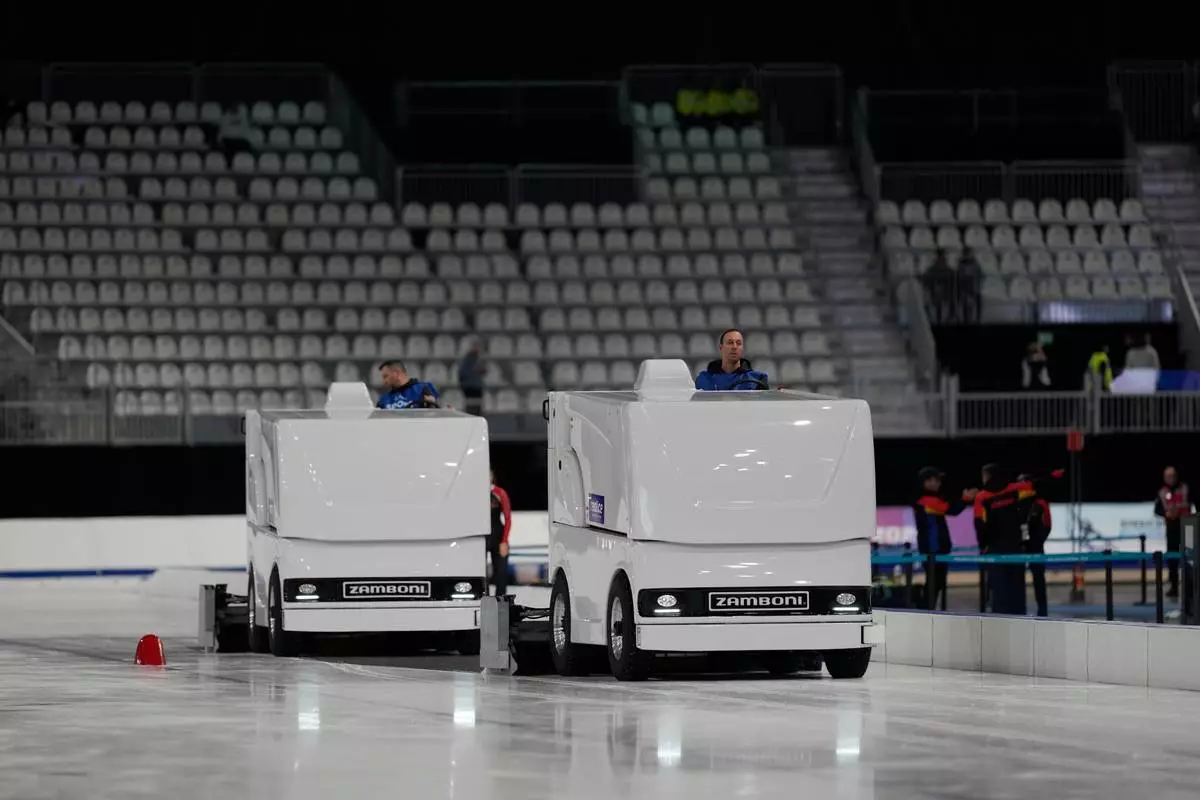
Workers clean the ice surface during a peed skating Junior World Cup and Olympic test event, in Rho, near Milan, Italy, Saturday, Nov. 29, 2025. (AP Photo/Luca Bruno)

Ice Master Mark Messer poses in the stadium where speed skating discipline of the Milan Cortina 2026 Winter Olympics will take place, in Rho, outskirt of Milan, Tuesday, Nov. 11, 2025. (AP Photo/Luca Bruno)

Ice Master Mark Messer poses in the stadium where speed skating discipline of the Milan Cortina 2026 Winter Olympics will take place, in Rho, outskirt of Milan, Tuesday, Nov. 11, 2025. (AP Photo/Luca Bruno)





